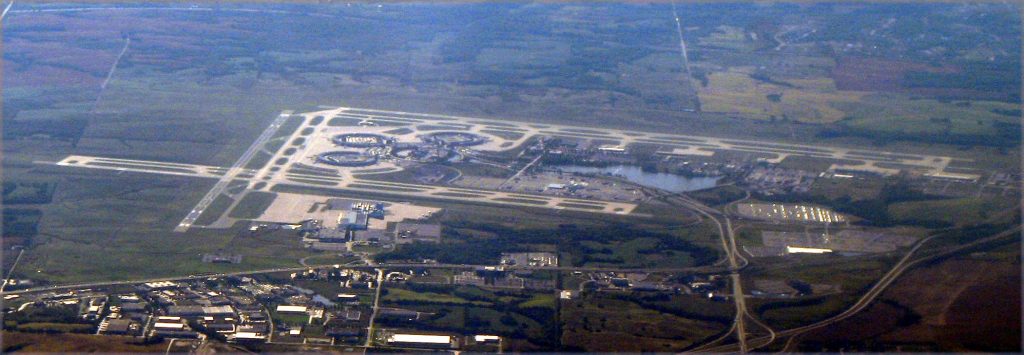
Since 2007, Kansas City officials have been devising plans for dealing with the inevitability of merging Kansas City International Airport’s (MCI) three terminals into one central terminal. This move is motivated by the excessive cost of upkeeping three separate terminals – including security checkpoints and retail and concession areas. Little legitimate progress was made on these plans until June 2014, when the mayor’s airport advisory board approved plans to officially begin work on the single terminal design.
Several construction and architecture firms vied to head this promising project – including Kansas City-based companies like construction engineering firm Burns & McDonnell and architecture company AECOM. Ultimately, in 2017, Kansas City voters approved a single terminal design by Edgemoor, an infrastructure and real estate firm based in Maryland.
On the KCI-Edgemoor proposal site, Edgemoor representatives claim their ideas for the new terminal will “enhance Kansas City’s world-class reputation by adding a world-class airport that will spur economic development, increase the long-term capacity of M/WBE and local firms, and build the workforce of the future.”
The project stands at a projected total cost of $1.5 billion, with the city promising that the new single terminal airport will be funded through payments by associate airlines – not by taxpayers. Negotiations with both large and small airlines on the sharing of this cost has slowed progress.
As of January 2019, only five of the eight involved airlines have tentatively agreed to the proposed costs and scope of the project. To make the project more attractive to airlines, the new KCI will offer a 50 percent discounted lease on each airlines’ first gate at the new terminal.
Despite these negotiations about cost, Edgemoor completed a concept design, including photos, for the new terminal in August of 2018.
As of December 2018, the current design plans are intended to emphasize Kansas City’s heritage as a “hardworking, pragmatic Midwestern town with a forward-looking nature.”
Among the features being added to the renovated terminal are a town square filled with restaurants and gift shops, revamped restrooms and more spacious lounge areas equipped with in-seat charging. Edgemoor is also making good use of natural light in effort to reduce costs of lighting fixtures, resulting in features in the design plan like large windows and a glass atrium.
The new terminal will have 39 gates and span over 1 million square feet – making it the largest ever infrastructure project undertaken in Kansas City.
“I think [it] will not only be as convenient, I think it will be much more comfortable, much more open, much more inviting, much more accessible than our current airport,” Kansas City mayor Sly James said. “It will also be more active. There will be more light… it’ll be more open. It won’t feel like a dungeon in places.”
A city council meeting was held Feb. 28 where 12 council members voted on several components of the project, which included a 666-page development agreement. This vote passed 11 to 1.
Council member Alissia Canady was the singular vote against the agreement, citing insufficient evidence of a net benefit for women and minorities as was claimed as an outcome of the renovation in the documents.
“We fell short in a number of areas, and I just wasn’t willing to be a rubber stamp on this deal when I knew we left a lot on the table,” Canady said.
Project leaders have dedicated a $22 million portion in the total budget for the project to an initiative referred to as “community benefits.” Some airlines have suspicions that this hefty sum could be indiscriminately used for plans that are non-related to the airport.
Project leaders have affirmed that those funds will go to training for airport staff and amenities for workers like public transit and childcare. Another example of the direction of these funds is Edgemoor’s agreement to use female- and minority-owned contractors in the construction of the new terminal – the very issue for which Canady did not see concrete enough plans.
The project is expected to generate approximately 5,000 construction-related jobs.
A citywide celebration is scheduled for 2:00 p.m. on March 25 when groundbreaking for the new terminal will begin. Construction is expected to conclude within the first few months of 2023.
